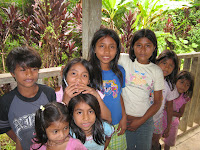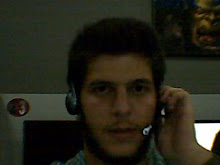

The next morning we woke up, gathered the supplies we needed, and a truck took us to Rio Arajuno, which we would need to cross in order to go to the community. Our purpose there would be do vaccinate all dogs for rabies. I paired up with Amanda and we were led into the jungle by Antonio and Paulina. The community we were visiting was a Kichwa community named Shikulin.



Trying to cross the river wasn't difficult; however, by the end I had managed to fill my boots with water and soak my socks. By the end of the hike my feet were completely raw and I my skin was split in a bunch of places. The hike was a bit hilly, but nowhere near as difficult as my hike into th Shuar community, Uwijint. One time we had to cross a log (makeshift bridge) that was about 30 feet long and hanging over a small river and mainly stones. Upon arrival to the community we took a break as we waited for the families closer to the community center to bring there dogs for vaccination. I took a look around at the school, which housed 4th, 5th, and 6th grade. They taught the children Kichwa, Spanish, and I think English and German, but how much I was not sure. In school, the kids also learned how to do daily survival activities, such as hunt, fish, and cultivate plants.



While Paulina was doing the vaccines, I took time to play soccer with the boys and we ended up playing two matches in boots in thick mud. We then hiked down to the river, where Antonio crossed by himself to vaccinate the dogs of a family that lived on the other side.

I took time to splash around in the river. When he returned we headed back towards Arajuno, passing by three more houses where I was able to vaccinate some of the dogs. At one of the houses the owners weren't home and the dogs were scared. We tried to lure them out with food and they would come but when we tried to grab them, they attacked. On one such occasion, the dog bit through the glove I was wearing and into my hand. Needless to say I was a little scared of possible rabies and so I have been getting the vaccine at Hospital Voz Andes, where I have done a few rotations.
Anyways after hitting up the remainder of the homes, we headed back and rested for the remainder of the evening. All-in-all we spent about 7 hours out hiking and vaccinating dogs.
The next day in Arajuno was spent in the Subcentro de Salud. It had been pouring rain that morning and the electricity was out as well. Not more than a minute after our arrival, an emergency patient was rushed in. He had been working that morning, cutting logs or poles with a chainsaw, which slipped out of his hand and sawed into the knuckles and his left hand. One of the knuckles had chipped and everything was exposed. We used headlights and flashlights to improve the seeing conditions for the doctor. I helped clean the wound and held the hand as the doctor quickly closed up the two major openings so that the kid could be rushed to Hospital Puyo, about an-hour-and-a-half away. The kid was freezing because he was soaked and didn't have any clothes to change into so I gave him my t-shirt. Shortly after they rushed him off. I was told that he was going to a Hospital for X-rays and tests and where they had more resources to better operate on his hand, but where there was only a general surgeon. The truth of the matter is he probably would never have full function of his hand again.







I walked around and took some picture of the clinic. There was an emergency room (very dirty), a sala de partos (birthing room?), where there was both a seated bed and a vertical rope for those who wished to be standing when giving birth (a very common practice in indigenous communities), and finally the dentist's office.
The remainder of the day was spent doing patient consults. The doctor at the Subcentro allowed us to play an active role in the checkups and diagnosis of the patients. I listened to lungs, looked at throats and ears, and when he asked told him the drug regimen required for the specific patient (namely how much the patient needed, based on a book he had on his desk). After examining each patient, he would ask what we thought it was and then tell us whether he agreed or not. The diagnoses seemed quite superficial and at times as if the doctor was just going of past history or the symptoms the patient emphasized. This is pretty common at Subcentros as they do not have any diganostic tools and can only prescribe basic medication. We left that afternoon for Puyo. When I arrived in Puyo, my housemate, Yoland, told me that there was a rotation scheduled to go back to Arajuno and educate the community on how to prevent malaria. So we signed up and the next morning headed back out to Arajuno--this time in the back of a truck. The ride was beautiful; however, by the end my butt was sore and my back bruised from bumping on the truck so much. Futhermore, the pesticide container was leaking liquid into the bed of the truck the whole ride!




The first purpose of the trip was to educate the community members at a meeting that had been setup in one of the public buildings. We showed up over an hour late and so everyone was already at lunch! So instead we headed out on a walk with Darwin, one of the field researches for the Malaria Center and looked for larva and pulpa and breeding grounds for mosquitoes.






In that very toilet, we found a mosquito larvae that was, I kid you not about an inch long. Apparently it will eat other mosquito larva. There are also specific bugs that each mosquito larva, a good natural approach to keep malaria mosquito numbers down. After about a two hour walk where we saw some neat things, snail eggs and snails, but not many mosuito larvae, we returned to the meeting room just in time to catch a fumagation. They didn't cover anything or move anything, just asked the family to get out and walked in a sprayed.

We decided to take a bus back because the truck was too much and it ended up breaking down because of flat, which delayed the return by about 30 minutes. And that was all for Arajuno!


gnarly bugs, once again.
ReplyDelete